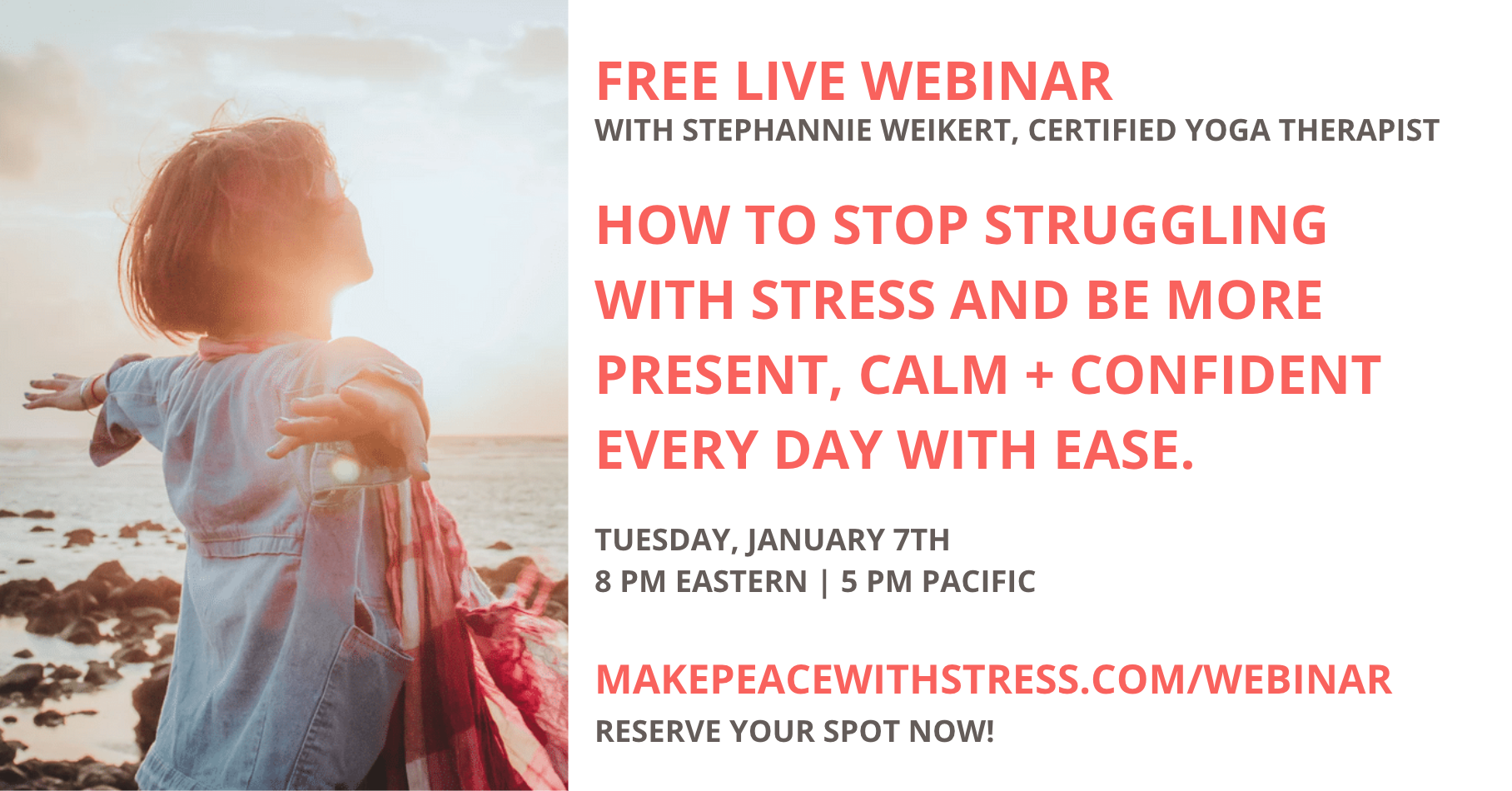With all the responsibilities, decisions and choices you have to make every day, life can feel demanding. Amiright?
And lately, the demands of life are pushing you to the very edge of your ability to keep it all together which has you feeling overwhelmed, frustrated, anxious, down about yourself, and downright stuck.
But you know there are some people that handle their demanding life with confidence, and even seem to be happy and thriving.
So the question is: why do some women seem to be able to manage everything and thrive while you struggle and feel stuck?
It’s the way you think about stress.
The way you think about stress makes a big difference in how you experience demanding (and even not so demanding) circumstances and could ultimately save your life.
I know this might seem too simple and like I’m waaay overstating here. I get it—sometimes being smart equals being skeptical. But let’s look at the science.
The University of Wisconsin conducted a study of 30K American adults consisting of 2 questions:
- Do you experience low, moderate, or high levels of stress in your daily life?
- Do you believe stress is bad for your health?
For the next 8 years, the researchers tracked the participants to see who died and found that those who experienced high levels of stress had a 43% increased rate of premature death.
But only if they believed stress was bad for them.
Guess who had the lowest death rates?
Not those with moderate or even low levels of stress, like you might think, but those with high levels of daily stress that simply did NOT believe that stress was bad.
Researchers at Harvard University conducted an experiment to figure out why high levels of stress is deadly for some and not others.
Participant’s hearts were monitored while they were put in stressful situations and those who believed stress was bad showed an increased heart rate and constriction of the arteries.
This is why stress is associated with heart attacks and cardiovascular disease. (Which, the CDC lists as the #1 cause of death in women!)
But here’s where it gets really interesting.
Those who believed their stress helped them through the situation also showed increased heart rates, but instead of constricting, their arteries relaxed and expanded.
This relaxation and expansion of the arteries is what happens inside your body when you experience joy. Not neutrality or contentment, but JOY! A feeling of great pleasure and happiness! (Crazy, right?!)
So a simple shift in thinking is the difference between those who meet the demands of life with confidence and thrive and those who struggle with stress and experience adverse health effects.
The placebo effect is a great example of how a belief in the mind directly affects our experience and illustrates how your mind and body work together to determine how stress affects you.
When someone believes they’re getting a beneficial treatment, their mind thinks healing will occur and the body creates the conditions to make that happen. But if they haven’t actually received treatment, the benefit is attributed to the person’s belief.
Obviously, this isn’t always the case, but the placebo phenomenon is real and applies directly to stress.
If you think that stress is helpful, your body uses the effects of the stress response, like an increased heart rate, in a way that feels expansive and supportive. Like you’re rising to the occasion and thriving.
But it works the other way too, when you believe stress is bad, it feels constricting and distressing, and you might feel like the demands of your responsibilities are more than you can handle, or focus only on possible negative outcomes, or be consumed with worry, frustration, and self-doubt. (Sound familiar?)
And this thinking fuels a vicious cycle.
When you believe your stress response is bad, it feels bad, you doubt yourself, and instead of welcoming the support of your stress response and using it to your advantage, which allows it to then switch off, your stress response stays on and you continue to feel constricted and distressed, which feels bad and IS bad.
Because this is the cycle of chronic stress, where you’re susceptible to the damaging health effects of stress because your stress response is always on, and you continually struggle with feeling overwhelmed, frustrated, anxious, down about yourself, and downright stuck.
The bottom line is that your nervous system is either in the stress response or in the relaxation response—it’s your thinking, your belief, about your normal stress response that toggles the switch.
But the good news is that you, by your ability to change your interpretation of stress from bad to helpful, have the ability to change your experience.
By embracing stress as supportive rather than distressing, you can feel confident and thrive instead of feeling overwhelmed and stuck.
You can choose to make peace with the stress in your life so that you can expand and feel the body’s experience of joy instead of feeling constricted and deal with the harmful effects of chronic stress.
I hope you’re thinking, ok, yes, I’m ready. What do I do?
There are 3 specific practices from yoga philosophy that are a potent yet surprisingly simple method for making peace with stress that I’ll be sharing in this free webinar.
Here they are in a nutshell (Join me for the webinar!):
- Notice when you’re feeling overwhelmed, frustrated, stressed or are otherwise struggling.
- Open to that opportunity to practice changing your mind about stress with one slow breath.
- Welcome your stress response by repeating to yourself, “Thank you for helping me.” or “This is happening to help me.” or “My body is supporting me in this situation.”
Submit a comment below to let me know how it works for you or ask any questions you might have.
It’s an honor to support you.



